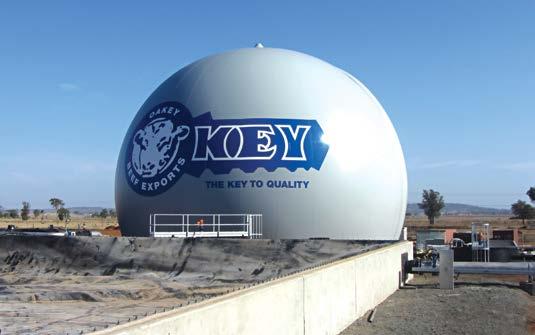RENEWABLE ENERGY
NH foods proves the value of green energy underfoot
While many environmentally aware energy planners look to the skies for wind and solar solutions, an astute Australian beef processor is showing what can be achieved by tapping the wastewater in its drains for green energy profits and sustainability benefits. NH Foods Australia’s Oakey Beef Exports plant in Queensland has shown food and beverage producers globally how environmentally responsible companies can tap the energy potential of their organic wastewater streams by anaerobic digestion technology to extract millions of dollars’ worth of biogas to replace fossil energy purchases. The Oakey plant on Queensland’s Darling Downs uses a Global Water & Energy (GWE) COHRAL™ (Covered High-Rate Anaerobic Lagoon) plant installed by Australian environmental engineering and green energy authority CST Wastewater Solutions, and is on target to achieve total ROI over the next couple of years and to go on to produce bottom line results virtually in perpetuity thereafter. “The wind doesn’t need to blow, and the sun doesn’t need to shine to produce this green energy – it is a highly viable renewable in its own right, which complements the many excellent solar and wind energy sources suited to other projects,” said CST Wastewater Solutions Managing Director, 32
Waste + Water Management Australia | March/April 2020
Michael Bambridge. “Ultimately, the plant will pay for itself with biogas then going on to produce virtually free energy for many years after that.” The performance of the plant – which was subjected to a review as it completed its fifth year of service – was so good that it was selected as a finalist in the global awards of the International Institution of Chemical Engineers (IChemE) late last year. The IChemE awards represent 37,000 engineers worldwide and recognise outstanding projects, people and companies in areas such as water and energy sustainability that benefit society in measurable ways. An earlier GWE anaerobic digestion plant has previously won an IChemE award for its performance on cassava waste processing in Thailand, again turning a potentially smelly production byproduct into a profitable asset. The review of the NH foods plant – which stores biogas it produces in a 6000m3 spherical polyester storage vessel – showed that the clean, compact and robust COHRAL™ plant is in outstanding condition, having required only routine maintenance over that time, while at the same time: • Reducing Oakey’s dependence on fossil fuel gas by the equivalent of upwards of $A800,000 ($US557,000) a year at current production levels of up to 4000m3 of biogas a day.
• Providing the capacity to produce even more biogas in the future – up to 6000m3 a day as stock throughput rises, saving the equivalent of 12,000 tonnes of CO2, equivalent to removing 2,700 cars from the road. • Radically increasing the quality of the plant’s wastewater effluent by transforming waste extracted from it into easily and safely stored energy. • Paying for itself, with total ROI to be achieved within approximately the next two years and the plant going on to contribute to ongoing profitability. “The GWE COHRAL™ plant occupies just half the footprint of comparable covered anaerobic lagoons and a much smaller space than is required by typical energyhungry and odorous open aeration lagoons in service globally,” says Mr Bambridge. “The biogas generated is directly used in the Oakey plant’s existing boiler, where it replaces natural gas, and sharpens costefficiencies.” The Oakey Beef Exports plant is one of Australia’s largest beef export facilities, with its products going to over 34 countries worldwide. The GWE anaerobic digestion technology involved in the COHRAL™ installation – and in compact reactor (tank) installations of the technology – is applicable to any industry with a biological waste stream, including food and beverage applications and livestock processing operations drawing on a global population of about one billion cattle (as well as a billion sheep, 750 million pigs and 16 billion poultry). Beef is the first challenge for carbon neutral livestock production and far-sighted organisations such as NH Foods Australia and the industry’s Meat and Livestock Australia are national leaders, working towards a beef industry zero carbon footprint nationally by 2030. Mr Bambridge says the plant is a leading example of a sustainability-focused company in the meat and livestock industry, which is particularly significant, given the United Nations Framework Convention on Climate Change, which recognises that beef is a major greenhouse gas (GHG) emitter with the beef sector of the livestock industry estimated to produce about 14 per cent of all GHG emissions. For further information, please contact CST Wastewater Solutions, T: +61 (0)2 9417 3611 E: info@cstwastewater.com or visit the website: www.cstwastewater.com










